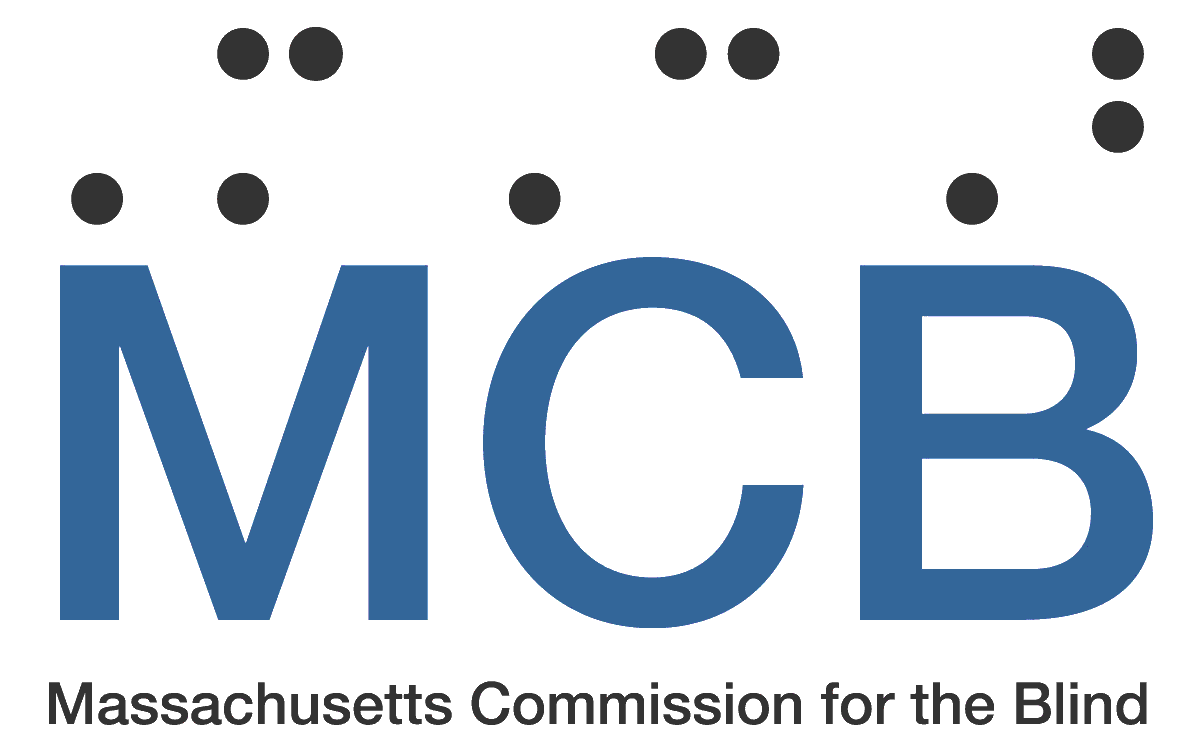- Massachusetts Commission for the Blind
Sheryl Erwin has worn glasses since she was five years old. At 27, she was diagnosed with myopic degeneration or a loss of central vision. Her vision would “go haywire” for a few months and then stabilize again and again.
“I knew that my eyes had always been bad, but by then I knew that I didn’t just have bad eyes anymore, I had a condition…and a diagnosis.”
Sheryl was referred to Massachusetts Commission for the Blind (MCB) by her eye care professional after being diagnosed as legally blind in February 2017 when she was 53 years old.
After that, Sheryl says that James (Jim) Badger, a Rehabilitation Teacher at MCB “saved” her along with Miranda Sholla, a Vocational Rehabilitation Counselor at MCB.
“Jim was literally the first person to start teaching me in my new role, and he was there to support me every step of the way,” explains Sheryl. “Miranda was always there too and really checked in on me from the beginning.”
Sheryl participated in an Independent Living Program at The Carroll Center for the Blind and enjoyed their technology program aimed at regaining employment.
“I always wanted to return to the workforce, but I ran research facilities and managed a lab for 25 years before my eyes got really bad, and I didn’t know what I would be able to do or if I would personally be comfortable doing that again…but I knew I loved the sciences.” says Sheryl who has a background in pharmaceutical research.
“Be your own advocate, and educate others who have perfect vision," says Sheryl. "I can still do the same job as a Research Technician III, but I just use a screen reader and a magnifier."
In addition to her classes, Sheryl worked at The Carroll Center for the Youth in Transition summer program that serves students ages 15 to 21 for six weeks in a residential setting. After completing her classes, she continued working part-time at The Carroll Center in a supervisory role.
“Sheryl not only brought her own life experience with vision loss to her work but also brought her professionalism, organizational skills, ability to communicate with compassion, and high expectations for our young people as well as adults,” said Dr. Jennifer Harnish, Director of Rehabilitation Services at Carroll Center for the Blind.
Sheryl was introduced to Joey Buizon, an Employment Services Director at MCB who is also visually impaired, and the pair came up with a plan for Sheryl to apply to Project Search, an Adult Internship Program at Massachusetts Eye and Ear (Mass Eye and Ear). She applied and was selected for a position in the Clinical Services department at Mass Eye and Ear loading patient images into a database. She thought it would be a good learning experience using new assistive technology in the workplace such as Fusion™ and JAWS®. She was in that role for two months when a position in the Vision Rehabilitation Lab at Schepens Eye Research Institute of Mass Eye and Ear became available. Sheryl applied and met with the director of the Lab for a tour, an interview, and a meeting with the Lab team. She got the job.
“I literally didn’t know if I would ever work in a Lab like that, but the team worked with me to set me up with all of the technology that I needed based on the Lab’s recommendations, things like a Zoom keyboard and a large screen monitor, along with a CCTV at my home and at the office.”
“As an individual with low vision, Sheryl brings an invaluable perspective to this work which could not be provided by someone with normal vision,” said Dr. Kevin E. Houston, Assistant Professor of Ophthalmology at Harvard Medical School; Director of the Vision Rehabilitation Service at Spaulding Rehabilitation Hospital in Boston and Cape Cod; and Staff at Mass Eye and Ear Vision Rehabilitation Service. “She has an important seat at the table where we discuss, improve, and invent future technologies…While she cannot see fine detail, her attention to detail is 20/20!”
Sheryl says that she loves her new job and is so proud of the skills that she has acquired in the workplace. She frequently works with Human Resources to ensure that the Lab is staffed to meet the needs of the work, and she works with doctors and Clinical Research teams to ensure that operations and administration is the best that it can be.
“I would love to stay at Mass Eye and Ear as long as the Lab and the job will have me,” says Sheryl. “Things are continually growing and changing, because that’s the nature of research and it’s so fascinating…it’s amazing to see how people can benefit from what we’re creating and I’m enjoying learning.”
Sheryl and her team are currently creating a set of eyeglasses to help people who have Ptosis, a condition that affects eyelid movement, making an eyelid(s) droop and often unable to stay open. The glasses have a small strip of magnet in the upper part of the frame that attracts another magnet placed on the eyelid. Sheryl and other researchers assess magnet strength and placement to provide the best product for people with Ptosis.
“Every day is a challenge, but you have to be your own advocate," says Sheryl. "You can get there. Be confident in the education and experience that you have as you search for a new position in the workforce. Be your own bridge between services and the working world. Confidence is so important, and you now have a different life experience to add to your knowledge base for employers.”
